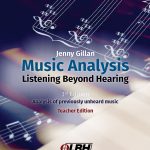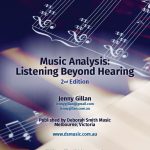Listening Analysis Resources
- Is it possible to feel more than one thing at a time? Is it possible to express more than one thing in music at the same time? Read more
- For the time poor who are wanting to improve their music analysis skills, I’ve got you covered! These videos were born out of a desire to provide resources to Music students and a lack of time. Fortunately, this seems to have been a winning combination and there are even people wanting to know where all ... Read more
- https://www.youtube.com/watch?v=RUpi_arLNjY&feature=youtu.be&fbclid=IwAR0LN-uwlu8RoPlN3NI4kFHks9noIFxCCFywj83pdYpOSDfvJDoEPpcAmD8 Question: Using only two of the following elements discuss how character is created in the following work: 1) tempo 2) blend of instrumental voices 3) tone colour 4) articulation Answer: Character: Tranquil Tone Colour The opening string quartet section begins with a unified warm, resonant tone colour due to the use of similar mid to low register, legato sustained chords. This aids the creation ... Read more
- This is the first Facebook analysis question for 2019! Go team!! If you’d like to play along at home, Like the Listening Beyond Hearing Facebook page for further questions, advice and event notification. One of my favourite songs most recently sung to me by my dear friend and piano man, Trevor Jones. Ironically, I just ... Read more
- Listening Beyond Hearing is now self-published and available at the ‘Shop’ tab of the Listening Beyond Hearing website. Read more
- To be used in conjunction with “Listening Beyond Hearing” Chapter VIII: Harmony Here is the forth completed video for use with the chapter on Harmony. Thank you to Timothy Mallis for your composition and to Eliza O’Connor for your work putting this video together. https://vimeo.com/330935814 Read more
- To be used in conjunction with “Listening Beyond Hearing” Chapter VIII: Harmony Here is the third completed video for use with the chapter on Harmony. Thank you to Mati Gwizdalla and Jem Sherwill for your composition and to Eliza O’Connor for your work putting this video together. https://vimeo.com/330912373 Read more
- To be used in conjunction with “Listening Beyond Hearing“ Chapter VIII: Harmony. Here is the second completed video for use with the chapter on Harmony. Thank you to Tim Mallis for your composition and to Eliza O’Connor for your work putting this video together. Read more
- To be used in conjunction with “Listening Beyond Hearing“ Chapter VIII: Harmony. Page 157 – 160. It has long been my wish to have these videos up online so that the audio and visual element can be used together while exploring the world of harmony covered in chapter eight. Thank you to ex students Mati Gwizdalla for your ... Read more
- Thank you for your analysis response, anonymous, and permission to publish it. https://www.youtube.com/watch?v=IGMabBGydC0 Question: How does articulation and tone colour create character in the following work? Listen to the first 1 min 30 seconds Character: joyful Jenn Gillan: Great having the character stated clearly at the start. the pizzicatto guitar (or banjo) in the upper register acts as a melodic accompaniment ... Read more
- Thank you for your analysis response, anonymous, and permission to publish it. https://www.youtube.com/watch?v=IGMabBGydC0 Question: How does articulation and tone colour create character in the following work? Listen to the first 1 min 30 seconds The character of this work is driven and upbeat with aspects of articulation and tone colour that create this are: Jenn Gillan: Consider more sophisticated character ... Read more
- After talking with Anna van Veldhuisen, and her commenting that her students were freaking out over the amount I write in my analysis, I decided it might be time to demonstrate how my mind works while I analyse music. So I’ve picked a piece and without preparation have analysed it for you, live to Video. Excuse ... Read more
- Listen to the first 1 min 17 seconds Listen to the first 1 min 8 seconds Question: How have different expressive outcomes been created through the elements of music in these two excerpts? Refer to improvisation, ornamentation and embellishment and one other element of music, either Dynamics Blend of instrumental voices Balance of instrumental lines Tone Colour Thank you, anonymous, for this response and ... Read more
- Listen to the first 1 min 17 seconds Listen to the first 1 min 8 seconds Question: How have different expressive outcomes been created through the elements of music in these two excerpts? Refer to improvisation, ornamentation and embellishment and one other element of music, either Dynamics Blend of instrumental voices Balance of instrumental lines Tone Colour Thanks to Sarah Bouquet for this response and ... Read more
- https://www.youtube.com/watch?v=fBq87dbKyHQ Listen to the first 1 min 17 seconds https://www.youtube.com/watch?v=5Wd–YgSCfA Listen to the first 1 min 8 seconds Question: How have different expressive outcomes been created through the elements of music in these two excerpts? Refer to improvisation, ornamentation and embellishment and one other element of music, either Dynamics Blend of instrumental voices Balance of instrumental lines Tone Colour Thank you to Jacob Biviano for this ... Read more
- Thanks to all who attended my 2017 presentation at the AMusE VCE Conference. My notes can be seen below. Read more
- Chapter Four: Texture Chapter Four of my book, Listening Beyond Hearing relates to musical texture. For this chapter I had an ex student, the talented Mateusz Gwizdalla, compose a melody which he then arranged using different textures. The score of these examples are in the book with further comment, YouTube links and activities. Hearing the textures as well as ... Read more
- Here’s the fourth response to the ‘Babe’ question, together with my feedback, as posted on the VCE Music Support Facebook page 2016. Again, thank you for your time completing this analysis and courage to have it published. This one is from Eliza O’Connor who’s getting much better don’t you think?! How is tension created in this ... Read more
- Here’s the third response to the ‘Babe’ question, together with my feedback, as posted on the VCE Music Support Facebook page 2016. Again, thank you for your time completing this analysis and courage to have it published. How is tension created in this piece? Analyse up until “Get yourself a dog, Hoggett” A tense , suspenseful chaotic character is created ... Read more
- Here’s the second response to the ‘Babe’ question, together with my feedback, as posted on the VCE Music Support Facebook page 2016 How is tension created in this piece? Analyse up until “Get yourself a dog, Hoggett” Tension is created through the manipulation of the expressive elements by the players. The opening features the airy, aspirate flutes in their middle register, ... Read more
- Here’s the first response to the ‘Babe’ question as posted on the VCE Music Support Facebook page 2016 https://www.youtube.com/watch?v=AZcpUUiaFzE How is tension created in this piece? Analyse up until “Get yourself a dog, Hoggett” Response gratefully received from Steven Alesi A tense and uneasy character is created in this work through a plethora of rhythmic, melodic and harmonic techniques that create ... Read more
- The third response to an analysis question set for the VCE Music Support Facebook page. Thank you for your responses! The Lumineers – Ho Hey Question: Describe how only two of the following expressive devices contribute to character in this work: Tone Colour Blend and Balance Articulation Dynamics Rhythm Character: carefree, folksy, and spirited Jenn Gillan: Watch ‘folksy’ as a term here. It’s ... Read more
- The Lumineers – Ho Hey Question: Describe how only two of the following expressive devices contribute to character in this work: Tone Colour Blend and Balance Articulation Dynamics Rhythm The overall character is laid back and joyous. Jenn Gillan: In a case such as this, where only two elements are required according to the question, it’s wise to state which elements you’re dealing with ... Read more
- The first response to the Facebook page analysis question. Thank you, Eliza O’Connor again for your work. https://www.youtube.com/watch?v=zvCBSSwgtg4 The Lumineers – Ho Hey Question: Describe how only two of the following expressive devices contribute to character in this work: Tone Colour Blend and Balance Articulation Dynamics Rhythm The character of this piece is reflective, joyful and peaceful. The Blend and Balance of the work is ... Read more
- The second sample response gratefully received. Please keep ’em coming and thank you for taking the risk. It’s a brave thing to do! https://www.youtube.com/watch?v=FRmlXFxqLcI Listen to the first 1 min 35 seconds. Question: How is character expressed in this work? An overall energetic character is expressed in this work: Jenn Gillan: Good choice of character word. Is the character the same ... Read more
- https://www.youtube.com/watch?v=FRmlXFxqLcI Listen to the first 1 min 35 seconds. Question: How is character expressed in this work? Thank you to Eliza O’Connor for this response. Character = lively, energetic, frantic, chaotic, urgent Jenn Gillan: A lot of character words. Maybe one or two fewer? Cluster like chords happen frantically lending the piece to feel urgent Jenn Gillan: Needs a little more ... Read more
- Thanks all those who attended the VCE Aural and Analysis skills day yesterday. We had such a responsive group, it was a real pleasure to work with you all. Nothing warms an educator’s heart quite like a room full of students asking lots of questions! Read more
- It was great to network and share some robust discussion at the aMuse VCE Conference once more. Thank you to all who came and participated. In my session we began but did not complete the guided listening sheet for tone colour in Iain Grandage’s, Travelling from ‘Remember Me’ Iain Grandage is an Australian composer so this work fits in with ... Read more
- New Chapters I’m excited to be working with some ex students and current colleagues preparing new chapters for my analysis book, Listening Beyond Hearing. New chapters which will (hopefully!) be ready for next year’s change to the VCE Syllabus: Harmony Articulation Form Comparison of works More analysis questions I am currently in the process of collating and editing sample harmonic analysis from my past Victorian ... Read more
 https://www.youtube.com/watch?v=d8v3HL9cv_I Brenton Broadstock Symphony No. 2 Stars in a Dark Night Sample Response III Discuss how tension is created in the work. In your answer, refer to only 2 musical elements from the following list: Tone colour Blend of instrumental voices Dynamics Articulation ARTICULATION/DYNAMICS Jenn Gillan: Firstly I would make sure I used headings to point out really obviously what you were talking about. Not ... Read more
https://www.youtube.com/watch?v=d8v3HL9cv_I Brenton Broadstock Symphony No. 2 Stars in a Dark Night Sample Response III Discuss how tension is created in the work. In your answer, refer to only 2 musical elements from the following list: Tone colour Blend of instrumental voices Dynamics Articulation ARTICULATION/DYNAMICS Jenn Gillan: Firstly I would make sure I used headings to point out really obviously what you were talking about. Not ... Read more- The Church – Under the Milky Way Sample Response II, By Hayley Witmore Question: How are musical elements used to develop character in this work? Easy going and relaxed character established at the beginning by: Moderate tempo – not rushed but give a drive with emphasis on beats 1, 3 and 4 in Common time is predictable and ... Read more
- The Church – Under the Milky Way Sample Response I Question: How are musical elements used to develop character in this work? Character: mysterious, brooding The male vocalist’s warm, resonant TC and the reverberation effect used create a sense of space, adding to the mysterious character At the beginning of the excerpt, the sparse homophonic texture of the acoustic guitarist ... Read more
- Guided Listening Worksheet 1 – Tenterfield Saddler Guided-Listening-Sheet-1-Tenterfield-Saddler (PDF – 49KB) This is a rhythmic focussed guided listening worksheet. Peter Allan is an Australian composer/performer so the song fits in with the post 1910 guidelines. Read more
- In my session at the AMuse VCE Conference this past weekend I presented a workshop on Listening analysis for previously unheard works. In discussion we came up with some questions that we help focus students’ listening. As promised, I have completed a Guided Listening analysis sheet for the song “The 5 Thing” by ... Read more







